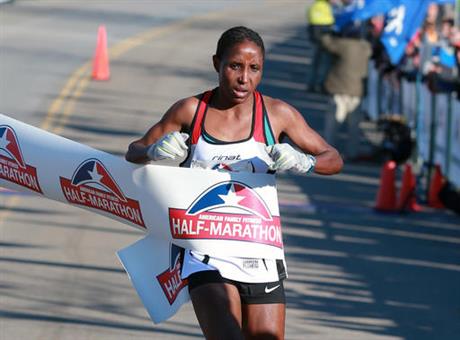The runners came in all sizes, shapes and ages, from 5 to 99. Celebrating the Fourth of July, some raced in starry tops, shorts and headbands. For them, the 5K through the grounds of a Kentucky whiskey distillery, raising funds for that night’s Independence Day fireworks, was strictly fun.

For super-fit Kenyans at the front chasing cash prizes, it was strictly business.
Stragglers in the 2015 Great Buffalo Chase were still catching their breath as Lilian Mariita bashfully climbed onto the second step of the winners’ podium, $2,500 the richer. But her whole way of life — crisscrossing America, cashing in at small races, sending winnings back home to her dirt-poor village in Kenya — was about to crumble.
Normally, the U.S. Anti-Doping Agency would have no reason to police the annual jog in Frankfort. This time, acting on a tip, drug testers were waiting.
Lab techs found steroids in Mariita’s urine sample. She was banned for eight years, the longest of any Kenyan runner. The 27-year-old’s racing career is over, and now she is back at square one: in Nyaramba, the muddy tea-plantation village in western Kenya she thought she’d escaped in 2011, when she left for the promise of a new life pounding American roads.
I used to rely on this for money and I don’t know what is left for me, Mariita said in an interview in the modest home she built with her U.S. winnings, sobbing while her Kentucky-born 2-year-old daughter gulped milk from a Minnie Mouse bottle.
What will I do now? What will I eat now?
___
With Mariita caught, track’s global governing body, the International Association of Athletics Federations, says it is also zeroing in on her agent, former elite Russian athlete Larisa Mikhaylova, and the Kenyan and Ethiopian runners she manages out of Kentucky.
Mikhaylova’s business model is simple. In exchange for a cut of their prizes, she enters runners into far-flung U.S. road races, from Florida in the south to Michigan in the north, that are small enough to be winnable but still large enough to offer modest cash rewards to top finishers. An added bonus for anyone thinking of cheating at lower-tier recreational runs is that they often don’t have funds for expensive drug-testing.
Mikhaylova’s runners have a remarkable success rate — and a string of positive drug tests, nearly all at races in Mexico. In an interview with The Associated Press, Mikhaylova insisted she was blameless, saying she registers athletes only for U.S. races and that runners were freelancing when they competed in Mexico. Still, their failed tests placed her business on the radar of anti-doping investigators and some U.S. race directors told AP they’ll no longer accept any of her runners. Three Kenyans who worked with Mikhaylova have been caught doping since 2012.
We are working with USADA on her, and that group in particular, said Kyle Barber, the IAAF out-of-competition testing and intelligence coordinator. The ultimate goal of this investigation is to stop her working, to stop her being an active agent, to stop her being involved in the sport.
Jynocel Basweti, the father of Mariita’s daughter, tested positive at a Mexican marathon for a steroid used in veterinary medicine. Nixon Kiplagat Cherutich was busted for a byproduct of the steroid nandrolone, also in Mexico. And Mariita failed two doping tests — one in Mexico, the other in Frankfort, Kentucky — in eight months.
Their stories represent the underbelly of a top-to-bottom doping crisis in Kenya’s thriving but ill-regulated running industry. The East African distance running powerhouse won 11 athletics medals at the 2012 London Olympics, but has also since suffered the ignominy of having 38 runners banned for doping violations.
The sluggish response of Kenyan authorities is generating mounting pressure for action from the IAAF and the World Anti-Doping Agency, and from Kenyan athletes concerned they might be turned away from overseas races, including the Rio de Janeiro Games in August. WADA has given Kenya until next Tuesday to fall in line with global anti-doping rules. Missing that deadline and being declared non-compliant by WADA could put the onus on the IAAF to then suspend Kenya from international competition, as it has Russia.
Probes into allegations of corruption at the Kenyan athletics federation also have gutted its leadership, with the IAAF’s ethics board suspending much of the organization’s top brass.
Efforts to combat Kenyan doping are further complicated by the fact that the majority of its runners compete, and often live, offshore, making their movements and behavior harder to police. Just five of the 38 Kenyan runners banned since the London Games were caught in Kenya. The rest tested positive at overseas races — from Beijing to Peru — testifying to the powerful lure of cash prizes that can put kids through school, buy land or livestock and turn mud huts into brick-and-mortar houses back in Kenya.
The culture of doping has taken a particularly strong grip on second- and third-tier Kenyan runners who mostly race abroad, aren’t regularly tested and won’t compete in Rio. As well as Mikhaylova’s camp, the IAAF says it is also investigating other groups of runners in the United States and Mexico and is working with USADA and WADA to better police the central-America region.
Agents from there are traveling to Kenya, cherry-picking athletes, and entering them in races with little or no drug-testing, Barber said.
We are aware of that exploitation taking place. We are identifying groups. We have seen patterns, he told the AP. The people at the head of these operations are aware of what they are doing. They plan carefully.
___
Speaking to the AP, Mikhaylova emphatically denied ever giving drugs to athletes. She described herself as nothing more than a service provider for East African athletes far from home, identifying and entering them in races she thinks they can win and looking after their other daily needs, in exchange for her 15 percent cut.
Mikhaylova runs her stable out of a two-story house in a working-class neighborhood of Newport, Kentucky, not far from Cincinnati.
AP reporters dropped in unannounced. Above the fireplace hung a portrait-sized jigsaw puzzle of the Kremlin. In the corner were dozens of medals and ribbons, hung haphazardly, two and three deep, won in places such as Akron, Ohio; Fort Worth, Texas; Duluth, Minnesota.
Runners pay Mikhaylova $10 rent per night, deducted from earnings. They stay for a month or two, then go back to Kenya, or sometimes Mexico, to train. The runners usually stay three or four at a time, rotating in and out, learning about the home and Mikhaylova through word of mouth.
They said the 46-year-old with a velvety Russian accent helps them with race entries, visas, groceries, even buying shoes, but that she has never once proposed banned substances. Mikhaylova told AP she wires prize money back to Kenya after deducting the expenses and her fee. She also said she drives runners to races — a merry-go-round of 5 and 10Ks, half and full marathons.
If they don’t win, Mikhaylova, herself the 1998 European Cup champion at 800 meters, said she sometimes takes a loss.
A very hard business, she said.
And grueling. Her athletes take on aggressive schedules to maximize prizes. In 2014, Mariita churned through 24 races in 13 states, including three weekends in March, April and October when she raced on consecutive days, according to the Association of Road Racing Statisticians.
Her U.S. race earnings soared to $24,000 that year — more than what 99 percent of Kenyans earn back home.
Mikhaylova handled the details. Mariita just ran.
She would choose and say, ‘This week, there is a race somewhere.’ I could not refuse to go, Mariita said. She would drive us to races. I never knew the places we went, I only knew I’m going to race.
One was a half-marathon in Carmel, Indiana, where Mariita won $500 last April. She finished nearly 10 minutes ahead of the women’s field.
By then, however, she shouldn’t have been racing at all.
Ten days earlier, in an April 8 letter addressed to the same gmail address Mikhaylova uses to register athletes for races, Athletics Kenya informed Mariita that she tested positive the previous December at a 10K in Ecatepec, Mexico. The detected drug was EPO, the same endurance-boosting injectable hormone that Lance Armstrong used as a shortcut to cycling fame.
The letter said Mariita was provisionally suspended and should no longer compete. But Mikhaylova said Mariita told her the letter was inaccurate — that she hadn’t done anything wrong.
And so Mariita and Mikhaylova plowed ahead, business as usual. Mariita needed money, and Mikhaylova said the runner begged her for more races. So she ran again, and again: nine races in eight states from April to August 2015.
Organizers of all nine races told AP they don’t test for drugs. For the Brian Diemer 5K in Cutlerville, Michigan, on June 13, Mikhaylova even entered herself along with Mariita, who won $400 as the second-fastest woman.
Then, they moved on to Frankfort.
___
Mariita told AP that race day started like any other: with pills — three reddish-colored capsules — given to her by Mikhaylova.
Mariita said the agent regularly gave her tablets for races, starting from when she joined her camp in 2011. Some came in a plastic bag, and she was telling me to take them twice a day, Mariita said. She said her assumption was that anything in pill form couldn’t be a banned substance.
She was saying they were multi-vitamins, Mariita said. All I knew is that when you are injected is when it is bad. Medicines taken orally are OK.
Mikhaylova denied ever having given tablets to Mariita. She said she repeatedly asked Mariita if she doped and warned that she wouldn’t work with her if she did. Mikhaylova said she suspects Mariita took something while in Mexico, away from her training group and far from Kentucky.
She said, ‘Larisa, I promise you, I’m clean, I’m fine.’ So, that is why I trusted her, Mikhaylova said.
All my runners, they take responsibility for themselves. I’m an agent. My job is to provide road races, Mikhaylova said. When they’re done, they go home. That’s all. This is their job.
From Frankfort, the sample USADA collected from Mariita was dispatched to the WADA-accredited U.S. laboratory in Salt Lake City. USADA asked for the full battery of tests, including expensive carbon isotope ratio analysis that tells naturally produced testosterone apart from synthetic versions of the hormone taken by dopers to build muscle and speed recovery.
Positive.
USADA says it informed Mariita on Aug. 14 that it, too, was suspending her. Yet the very next day, she raced again, finishing fifth and out of the prizes in a half-marathon in Parkersburg, West Virginia.
Mikhaylova’s history of working with runners who have tested positive extends beyond Mariita, Basweti and Cherutich. She also represented Shitaye Gemechu, an Ethiopian who tested positive for EPO in 2009 and was banned for two years, registering her for a 10K and a 5K she won in South Bend, Indiana, last June. Mikhaylova’s club website also lists Aissa Dghoughi among her athletes. The Moroccan got a three-year ban in 2006 for fleeing an anti-doping control in Switzerland.
Without waiting for the outcome of the IAAF probe, race directors in the middle of the U.S. are distancing themselves from Mikhaylova’s group.
When Mikhaylova emailed organizers in Indianapolis last May to enter two runners in their Monumental Mile, they responded with a copy of their new anti-doping policy. It specifies that athletes won’t be eligible for prize money if they work with agents who have had two or more athletes banned.
For Mikhaylova, Indianapolis organizers highlighted that part in yellow.
__
Back at the Newport house, the latest group of athletes is there to compete, including 35-year-old marathoner Peter Kemboi.
The athletes told AP reporters they had seen no drug use while working with Mikhaylova, and that they are concerned about being seen as guilty by association.
When they say that about Larisa, it’s bad for me, because now they’ll say, ‘Oh, why is he doping?’ Kemboi said.
Kemboi and another runner, Kennedy Kemei, said they know Mariita. But they spoke of her as if she were a stranger.
This lady, she was suspended for doping in Mexico and Larisa was not there, Kemboi said of Mariita’s first positive. She was there doing her own thing.
Like many runners who end up with Mikhaylova, Kemboi came to America in need of help. He couldn’t find anyone he could trust, until acquaintances pointed him toward the Russian.
She was a runner, Kemboi said. She understands. When you’re a runner, you can do well today, but you can’t guarantee tomorrow. Not everyone understands that.
Kemboi said he’d be happy to take a drug test any time, any place.
He’s a crazy guy and he cannot run fast, Mikhaylova explained as she sat on the couch in the dimly lit living room, putting Kemboi’s recent marathon times, all in the non-elite 2 hour, 40-minute range, into perspective.
Even an American amateur runner can do that. He cannot make big money that way. He can only do small marathons where he has a chance to make money, she said.
And Mikhaylova can find them.
In February, Kemboi ran three marathons in three consecutive weekends — two in Florida and one in Mississippi.
His total winnings: $1,400.





